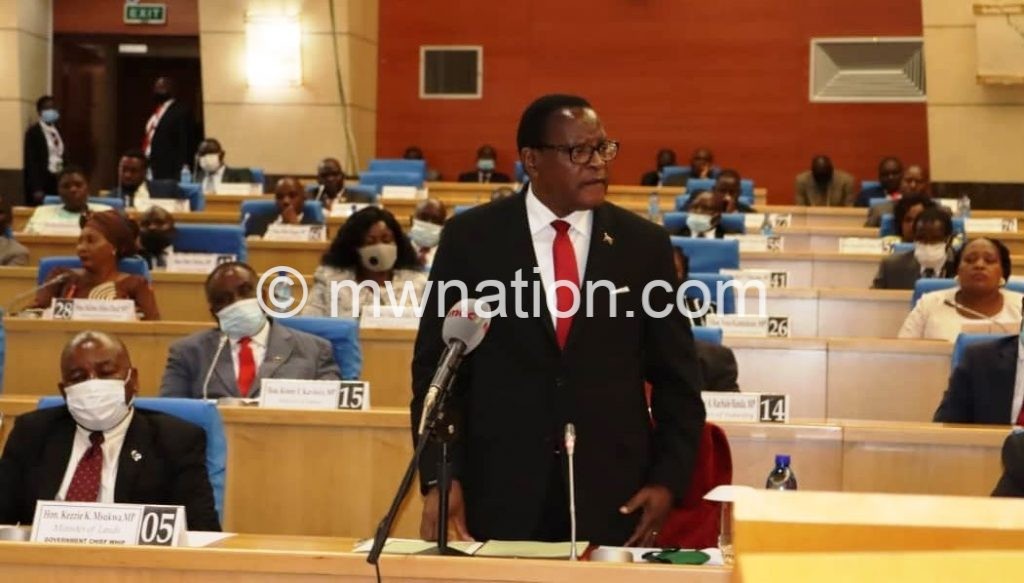Malawi chooses Covid-19 vaccine
Malawi has made AstraZeneca its choice Covid-19 vaccine and the first consignment targeting 20 percent of the population, or roughly 3.8 million people, is expected end February for the planned roll out in March.
President Lazarus Chakwera announced the choice of AstraZeneca vaccine last evening during his weekly status update on efforts to combat Covid-19 in the country.
He said the first consignment of the vaccine will target frontline healthcare workers, the elderly who are more vulnerable to the pandemic and people with underlying health conditions.
Said the President: “Through the Covax7 facility, we have finally secured doses of the AstraZeneca vaccine to give as many citizens as possible immunity against Covid-19.

“Our own scientists in our own labs will verify the safety of the vaccine and will give you full information so that no one is misled by social media lies and propaganda against vaccinations that the scientific community has worked hard to provide to save lives.”
Chakwera, who was flanked by Presidential Task Force on Covid-19 co-chairperson Dr John Phuka and Malawi Institute of Engineers representative Videlia Moyo, described the impending arrival of the vaccine as a major breakthrough.
Chipping in on the vaccine, Phuka said Malawi had adopted the herd immunity approach and will target to vaccinate between 60 and 80 percent of the population.
While acknowledging myths and fears surrounding any vaccination, he said he was optimistic the Covid-19 vaccine will be accepted as the country has had 80 percent to 90 percent acceptability.
“Previously, Malawi has done well on vaccines. There are lots of myths, but be assured that you will be protected,” said Phuka.
In a telephone interview after the televised address, he said the task force has produced a schedule of those who will benefit first.
Said Phuka: “Distribution will be an ongoing exercise. We have developed a communication plan, will engage the public.”
Currently, there are six pharmaceutical firms that have placed their vaccines on the global market. They are Pfizer/Biontech, AstraZeneca, Sanofi-GSK, Johnson and Johnson, CureVac and Moderna. There are also other vaccines currently under development in China and Russia.
The Covid-19 vaccine issue has pitted developed countries against developing countries which accuse the rich of hoarding the available vaccines at the expense of underprivileged people in developing countries.
In a written response on the European Union (EU) response to the Covid-19 pandemic, EU Delegation in Malawi head of development cooperation Ivo Hoefkens said on Tuesday that EU has set aside an 850 million euros package to cover for the Covax facility to help secure 1.3 billion doses of vaccines for 92 low and middle-income countries, including Malawi.
The pharmaceutical companies alleged that they are facing supply shortages, but the EU and several world leaders, including South African President Cyril Ramaphosa have expressed concern that some rich countries are hoarding the virus at the expense of the poor in developing countries.
During the briefing, the President the Malawi-Liverpool Wellcome Trust laboratory within the precincts of Qeen Elizabeth Central Hospital in Blantyre has made a breakthrough by having the capacity to sequence the virus that causes Covid-19.
He said: “The significance of this viral sequencing capacity, it has been confirmed that the new strain of the virus from South Africa is indeed here in Malawi. This confirms that we were right to treat this new wave with the seriousness it demanded, and so we must stay the course in preventing it from spreading.”
Chakwera observed that the country has improved on testing and has enough testing kits to last it a month before a new consignment arrives in the country, stressing the importance of early reporting of suspected cases to stem of the pandemic.
He said 62 out of 77 testing sites have been established across the country while new temporary field hospital at Bingu National Stadium in Lilongwe has now been occupied with 80 patients moved from Kamuzu Central and Bwaila hospitals. The facility is expected to have 300 beds, but Chakwera said it opened yesterday with 240 beds.
The President also brought upbeat news about increased numbers of those recovering from the pandemic—citing 1778 who have so far recovered from Covid-19 but still warned while the number of new infections were receding, they were still too high.
Chakwera also said 1 128 out of the 1 380 health workers who were targeted for recruitment as part of the Covid-19 response have been employed.
Malawi is experiencing a second wave of the Covid-19 pandemic which in January alone has killed at least 500 people. The country first reported Covid-19 cases on April 2 2020.





